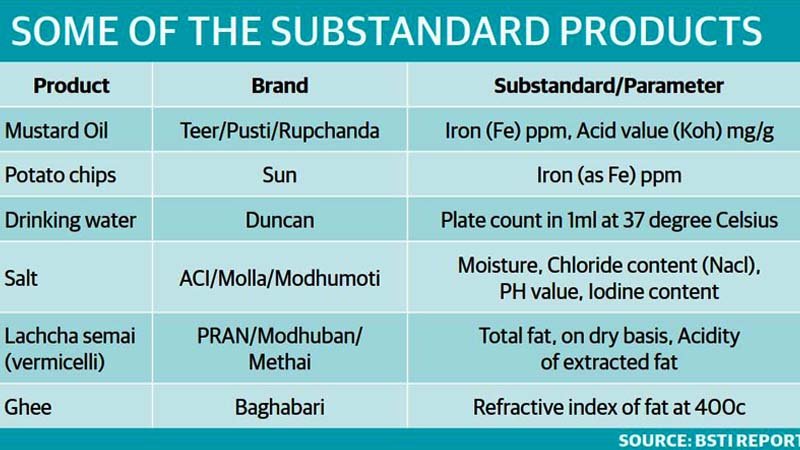Protecting consumer rights

The recent situation regarding the hygienic standard of all marketable foods evidently gives us staggering statistics of food adulteration as according to a survey more than 75 per cent of all foods sold in the markets are in some way or the other is adulterated. The High Court has recently banned production and sale of 52 sub-standard food products found to be injurious to human health.
HC asked the authorities concerned to remove 52 food items of different local brands from market as they were identified as substandard in quality tests of Bangladesh Standards and Testing Institution (BSTI). Reports say that 75 per cent fruits, 50 per cent vegetables, 70 per cent rice, 60 per cent of both branded and open edible oil selling in the markets of Dhaka and elsewhere across the country are dangerously polluted now.
There is no denying that we have consumer rights protection law-2009 in place through which we can file complaints against the treacherous service providers. But we cannot do anything when the prices of daily essentials rise without any profound reason but only due to the greed of the unscrupulous middlemen. We also cannot do anything when we are cheated during buying adulterated food, electronic commodities and many alike. This is how the ‘feeble fence’ of ‘protection of consumer rights’ law’ is safeguarding us. Hence, how can we say that we have been successful in protecting the rights of the consumers?
Food adulteration and price hike of essential commodities without any valid reason are two important aspects that should be reflected in our endeavors towards protecting the right of the consumers. Are the foods we buy consume safe and hygienic? Are the services given by the service providers worth the money they take from us? Are the electronic produce such as tv, fridge, ac that we buy worth our hard-earned money?
However, every year in the month of Ramadan authorities concerned makes routine pledges over of keeping the price of essential commodities stable but fails completely to fulfill it. As a result, consumers have to bear the brunt of soaring prices throughout the whole month. Earlier before Ramadan the Commerce Minister pronounced that prices of essential commodities would not go up during the holy month.
The common people are habituated to hear such promises as are usually made every year. The tragedy is that the general public knows that such call will have no impact on the market. Considering this, the government should take harsher stand against the unscrupulous traders. The government has to enhance its market vigilance and the monitoring process should be equipped with adequate manpower and resources.
There was a time when our constitution had no assimilation to safeguard the interest of the consumers. There was no scope for the consumers to address their complaints.
The country first came up with the law in 2009. As per the law the Directorate of National Consumer Rights (DNCR) was incorporated to protect consumers’ interest and ensure fair and transparent services in trading of goods and services. Since 2014, people have been reportedly filing complaints with DNCR. We are told that DNCR was not widely familiar with masses of the people.
Moreover those who knew about the law were not that concerned about issue so that they lodge complaints over violation of their rights as consumer. Thanks to the directorate for deploying numerous campaign over the years to create awareness among the people about consumer rights.
It is good news that in recent times, the number of complaints with the Directorate of National Consumer Rights Protection (DNCRP) against consumer rights violations has seen a boost which certainly reflects the increasing awareness among the consumers about their rights.
DNCRP disclosed that complaints in written rose by 46 per cent in 2017-18 fiscal year (FY). Some 9,019 complaints were lodged against businesses like restaurants, retail chain shops, as well as e-commerce and telecom service providers in the last FY. In FY17, the number was 6,140.Untill the last week of October of current fiscal (FY19) the directorate has so far received 3,157 complaints against various business entities.
However such an increasing number of complaints do not indicate that the situation of consumer rights in the country has worsened, rather it signifies the increasing awareness among the consumer about their rights. According to the law if one is cheated by business by any means, he or she can avail the service by providing required evidence.
Report shows that DNCRP fined 13,652 businesses in FY ’18, against 10,729 in the previous fiscal year. The most common complaints were overpricing, sale of adulterated or expired goods, information gap between adverts and real products, and poor delivery of goods.
Protection of consumer rights empowers the consumer and makes consumers more confident. Thus it helps boost competition and spur economic growth. In this regard, there is a need to formulate a competition law in order to increase competitiveness among businesses so that consumers around the country can avail quality goods and services at fair prices.We appreciate the gravity of responses that has been showed by the consumers. But still there is a need for making further publicity regarding DNCR so that every citizen becomes conscious of their rights as consumers.
The writer is Editorial Assistant, Bangladesh Post.



